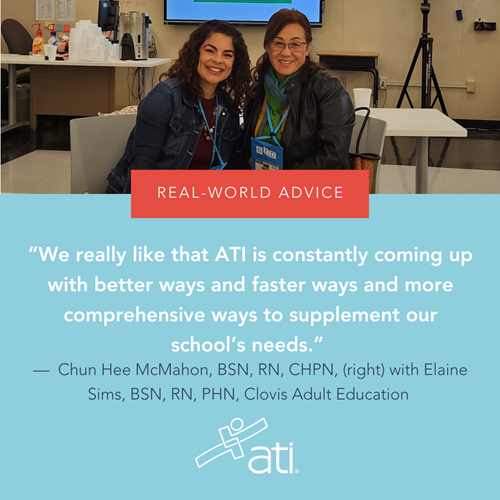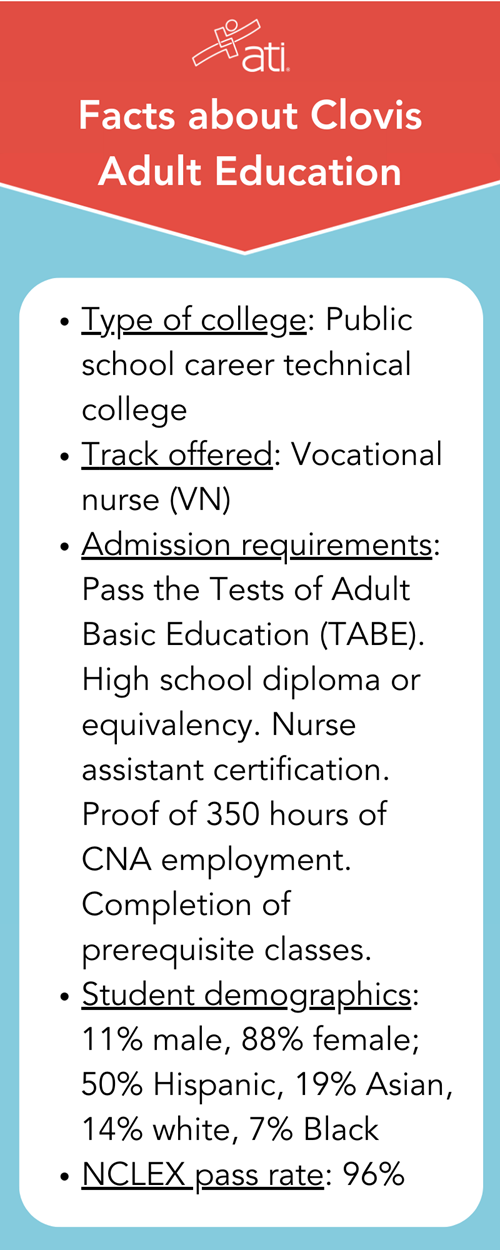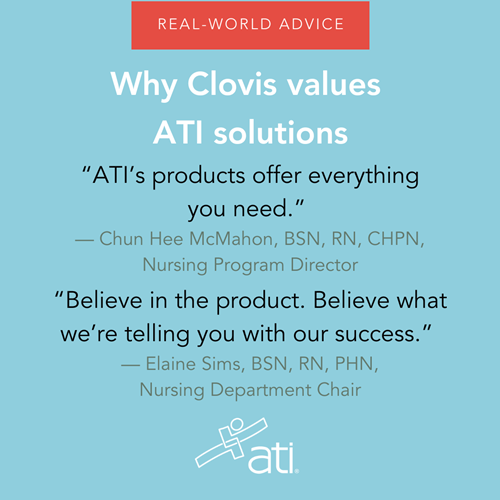How Clovis Creates the Absolute Best Practice-Ready Nursing Students
High NCLEX Scores Matter. But What About Creating Practice-Ready Nursing Students?
Becoming a vocational nurse is the goal. But Clovis Adult Education strives for even greater success for its graduates — especially its English language learners (ELLs).
 Your nursing program undoubtedly aims to graduate every student possible and see them pass the NCLEX. But what about ensuring that you are creating practice-ready nursing students? Even with the Next Generation NCLEX (NGN) now assessing candidates’ clinical judgment skills, being practice-ready is not necessarily a given.
Your nursing program undoubtedly aims to graduate every student possible and see them pass the NCLEX. But what about ensuring that you are creating practice-ready nursing students? Even with the Next Generation NCLEX (NGN) now assessing candidates’ clinical judgment skills, being practice-ready is not necessarily a given.
Learn more about becoming an ATI Complete Partner
Yet, at a high school adult education program in Clovis, Calif., faculty are confident their VN students are prepared on Day One for the rigors ahead.
Despite about half of the students being English language learners (ELLs), this program has pinpointed how to help its students overcome their unique challenges. A big part of their effort relies on the use of ATI solutions. And the result has been stellar: a 96% NCLEX pass rate with employers raving about their new employees’ readiness to work.
Moving Forward Against a Tide of Doubt
Chun Hee McMahon, BSN, RN, CHPN, Nursing Program Director, has been at Clovis Adult Education since 2014. Within a few years of joining, she wondered why no one was using the school’s ATI solutions. The program was still giving paper-pencil tests, and — while they were above state averages — pass rates were only in the low 80s. She saw the advantages ATI solutions offered in creating practice-ready nursing students, but trying to put them to use nearly put her out of a job.
“They had purchased ATI as a Complete Partner but were using it only minimally, and nobody was really knowledgeable about it,” McMahon explained.
“So, I started utilizing it at full capacity, and I almost got fired for insisting that students use ATI Capstone Content Review.” But with the support of a colleague, Elaine Sims, BSN, RN, PHN, Nursing Department Chair at Clovis Adult Education, she convinced faculty to adopt not only Capstone but also Virtual-ATI the next year.
“From there, Elaine and I just started monitoring the success rate, and then I knew it was working,” she says.
Supporting ELL Students to Become Practice-Ready Nursing Students
McMahon and Sims faced many more challenges, especially regarding the ELLs in the program. The students don’t have strong academic backgrounds, she explained. Most have only been in the United States a short time. And, typically, their reading, writing, and English language skills aren’t strong.

“We have to teach them critical thinking, as well as writing. And we have to teach them how to take a test,” McMahon said. The first step is getting them acquainted with a computer. Next is the use of ATI’s “Test-taking strategies” seminar.
“Their comprehension is not like college-level students,” she added. “But we set a high standard.” The program’s passing score to move to the next level of courses is a 78. No student can slide by with only a 70%.
While the program relies on a wide range of ATI solutions to help its students achieve those scores, several are especially important. As mentioned, “Test-taking strategies” has been crucial as has the incorporation of ATI’s Capstone and Virtual-ATI (V-ATI) solutions.
Becoming Graduation-Ready (and Practice-Ready)
Before using Capstone, students didn’t have an opportunity to remediate their weak areas. But, with it, “students have to go back and review every section, every course, beginning with fundamentals to med-surg and pharmacology,” McMahon said.
“As they are reviewing, we can see their improvement.”
The students must complete Capstone on their own time, so the program incentivizes them to participate by giving them points to improve their grades. But faculty also set expectations early that students will need resources like Capstone by explaining that the Clovis program is rigorous in its expectations to develop them into practice-ready nursing students.
Assigning students to participate in V-ATI is similar. Clovis requires students to finish 50% of V-ATI before graduation. Then faculty encourage them to keep studying with it while they wait to receive their authorization to take the NCLEX.
McMahon explains to them that if they receive their “green light,” then they are 99% guaranteed to pass the NCLEX as long as they sit for the exam within 3 weeks of that achievement.
“I tell the students there is no reason to go out and buy another NCLEX-prep course because you already have ATI. ‘Save your money,’” she tells them.
She also emphasizes there is no “golden ticket” to passing NCLEX.
“They start talking to their nursing friends and ask, ‘What did you use to study for state boards?’ And [those students] tell them, and they think that’s the golden ticket,” McMahon said. She explains to them that that no matter what study materials they use, if they don’t put 100% effort into preparing, they won’t pass.
“I just tell them, ‘Save your money. You already have Virtual-ATI for 12 weeks.
“I tell them that, once you choose a test date, you’ll be ready. You’ll be ready to go. That’s how I pitch it to them. And it works. It works,” she said.
Creating Practice-Ready Students by Taking Advantage of a Variety of ATI Solutions
Before Capstone, students get the support of other ATI solutions that are especially helpful to ELLs.
Sims pointed to the advantages of the videos incorporated into Skills Modules. “I do think it is easier for them to watch the video and watch the skills being presented rather than just reading,” she said.
Skills Modules was also an integral part of the school’s curriculum during the pandemic, Sim said. She took special advantage of this resource for the program’s PN adult med-surg course.
“I loved it!,” she says. “Everything’s there for you!”
She assigned Skills Modules on “Comprehensive physical assessment of an adult” and “Enteral tube feeding.” She would then assign the completion of a learning template on system disorders focused on Parkinson’s Disease.
“Then we would go to the clinical scenario,” she said. She also assigned modules in HealthAssess 2.0, focusing on documentation via EHR Tutor.
“I love that,” she added, especially the student checklists. “I would post the checklist so students would stay on track and knew what was expected of them.”
She explained that the checklist included the objective, "which is wonderful," she said, and it is step by step. Plus, she liked that ATI provides a recommended time for students to complete each Skills Module.
“I knew, when the students would submit their report, I could look at their time and make sure that they met the time limit,” she added.
Don’t Just Prepare for Graduation; Prepare for Practice
 “I actually tell other schools that their students may pass the NCLEX, but they maybe have the very minimum knowledge when they go out in the field,” McMahon said.
“I actually tell other schools that their students may pass the NCLEX, but they maybe have the very minimum knowledge when they go out in the field,” McMahon said.
“But our students are strong; they have seen a lot of things, and they have practiced a lot of them. So, they know when to ask a question.
“A lot of nurses on the floor tell our students — even though they were in an LPN program — they have much stronger knowledge, even compared to students who are in RN programs.”
For any program considering whether becoming a Complete partner will lead to creating practice-ready nursing students, McMahon had one piece of advice: “ATI’s products offer everything you need.”
Sims’ advice was similar. “Believe in the product,” she says. “Believe what we’re telling you with our success.”
ATI offers so many modules and assessments that programs will definitely see a difference in student outcomes after using ATI products.
But, she added, “They will see the difference when implementing ATI throughout the whole program. I think that’s what’s been successful for us.”
Clovis is an 18-month program, so its students get 18 months’ worth of ATI tutorials, modules, and assessments she explained. That’s their advantage, Sims said.
McMahon also wanted other programs to understand her appreciation for ATI’s support as nursing education evolves.
“We really like that ATI is constantly coming up with better ways and faster ways and more comprehensive ways to supplement our school’s needs,” she said.
Talking to an ATI staffer, McMahon added, “My appreciation to you is you are constantly growing, and it’s very convenient for us because you have it all, whereas other vendors may only focus on testing questions but may not have necessarily simulation parts.”
Her advice for other programs? “You need to purchase the full package from ATI.”
Facts About Clovis Adult Education
- Type of college: Public school career technical college
- Track offered: Vocational nurse (VN)
- Admission requirements: Pass the Tests of Adult Basic Education (TABE). High school diploma or equivalency. Nurse assistant certification. Proof of 350 hours of CNA employment. Completion of prerequisite classes.
- Student demographics: 11% male, 88% female; 50% Hispanic, 19% Asian, 14% white, 7% Black
- NCLEX pass rate: 96%.

